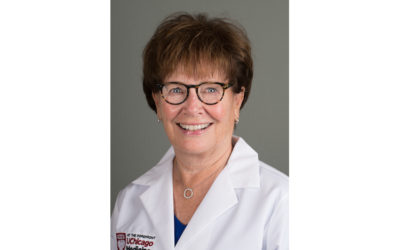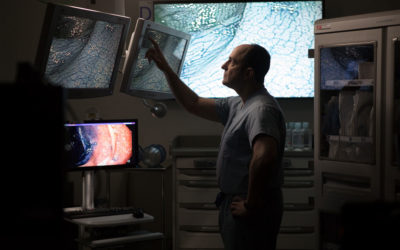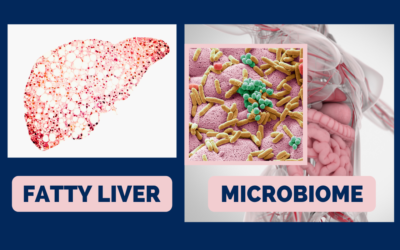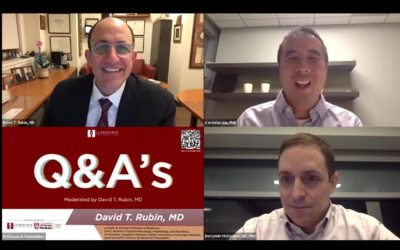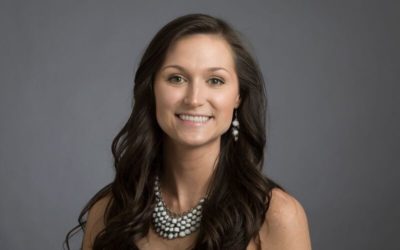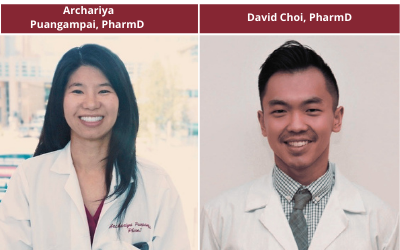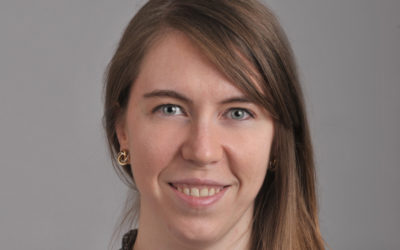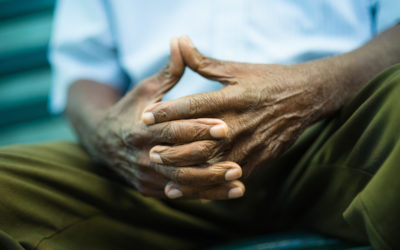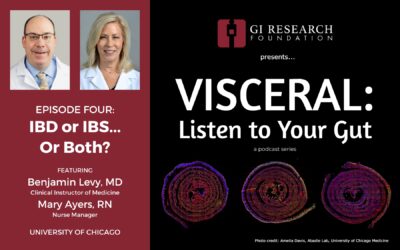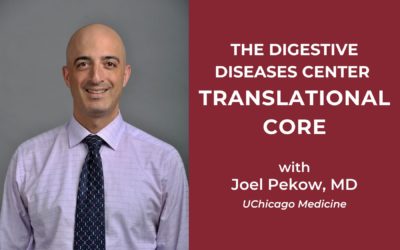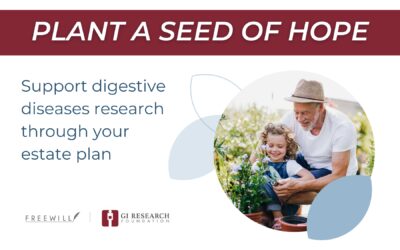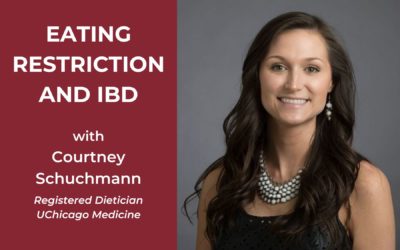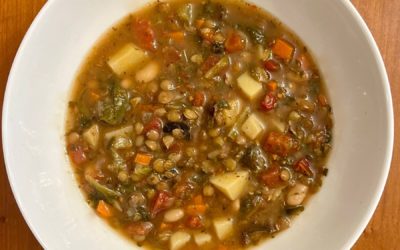Newsroom
Spotlight on Research
Provider Profile: Janice Colwell, Advanced Practice Nurse, Powerful Advocate for Patients
Colwell encourages any patients who will undergo surgery to create a stoma to meet with an ostomy nurse and ensure that they get good follow-up care to help them avoid complications and correctly use their pouching systems.
GIRF In the News: Preparing for the Next Pandemic – Featuring David T. Rubin, MD
On January 14, 2022, David T. Rubin, MD, Joseph B. Kirsner Professor of Medicine, Co-Director of the UChicago Medicine Digestive Diseases Center and GIRF Lead Scientific Advisor, shared insights on the current state of the COVID-19 pandemic, its impact on healthcare workers, the Omicron and future variants, the possibility of herd immunity, and planning for future pandemics on Steve Dale’s Other World on WGN Radio.
Patient Spotlight: Reaching New Heights with PCT (Pacific Crest Trail), with PSC, and IBD: Adam Rubinberg with his mother, Amy Rubinberg
After enduring the altitude and the rigors of strenuous hiking...
A Closer Look: Research Processes at the University of Chicago Medicine Featuring Michael Charlton, MBBS
““Perhaps our greatest strength in basic science research is with the microbiome [e.g., the bacteria that live in the gut]. We helped develop an animal model for liver disease that become one of the most widely utilized in the world, as it recreates lipid diseases in mice. That enables us, in the lab, to study causes of the liver disease and also ways to prevent and reverse it. In particular, Dr. Eugene Chang’s work with the Duchossois Family Institute [at the University of Chicago Medicine], discovered that mice that don’t have any microbes, animals that have been bred to be germ-free, and live in germ-free facilities, are totally resistant to fatty liver disease.”
Moving the Needle: Forward, to the Future!
On Thursday, December 2nd, more than one hundred GIRF supporters joined the University of Chicago Medicine Digestive Diseases Center online for the second presentation of Moving the Needle: An Update on GIRF’s Impact. Eight esteemed physician scientists shared latest research updates informing the treatment and care of inflammatory bowel disease (IBD), liver disease, colon cancer, celiac disease, as well as the impact of the gut microbiome on depression and anxiety.
November 17th Diet and Nutrition Educational Webinar for Patients featuring Courtney Schuchmann, RD
“If you are doing well, I highly encourage you to avoid overly restricting your diet… [but] IBD looks very different from one person to the next, and diet looks extremely different from one person to the next,” explains Courtney Schuchmann, RD.
Faculty Profile: Michael Charlton, MBBS, Treatment of Liver Disease and Liver Transplant at University of Chicago Medicine
“I also have the happy experience of patients who say, ‘I saw Dr. John Fung, and he saved my sister’s life. We’d been told nothing could be done.’ I recently treated a patient with bile duct cancer who had been told his cancer was inoperable, and he came here and it was taken care of. With Dr. Rubin, we recently had a patient who failed multiple therapies for Crohn’s disease, and Dr. Rubin simply said, ‘We’ll get you into remission.’ He wasn’t just bragging; he did it.”
The Multidisciplinary Team: Integrated Specialty Pharmacy Featuring David Choi, PharmD and Archariya Puangampai, PharmD
Fortunately for patients at the University of Chicago Medicine Digestive Diseases Center, specialty pharmacists David Choi, PharmD, BCACP, and Archariya Puangampai, PharmD, BCPS, have honed expertise in helping patients understand their medications, and also navigate other barriers such as insurance challenges to gain access to these life-changing medicines.
Montana Weissner, Empowered IBD Patient, “Taking care of your health is most important.”
Wise beyond her years, she has sage advice for patients with Crohn’s disease: “Don’t be afraid to grieve. It’s going to be really hard, and you are going to feel sad, and that’s okay. And also, don’t get caught up in what you think everyone else is doing.”
2021 GIRF Scholar Kinga Skowron Olórtegui, MD, Update: Pouchitis Risk Factors Database
Different risk factors, including the type of sutures used to create the pouch, BMI, patient’s sex, prior C. difficile infection, and prior use of anti-TNF medications, all predicted different types of pouchitis.
2021 GIRF Scholar Tina Rodriguez Update: Investigating Inflammation, IBD and Mental Health Disorders
Research suggests inflammation itself may influence a patient’s development of mental health disorders. In this way, treating inflammation could have benefits for a person’s mental state.
Billy Perry, former Hepatitis C patient, “I won’t waste their time. If they don’t work, then I can’t work. If I don’t work, I’m gone…”
“This is the only hospital I have ever known to sit down with you, literally. They don’t hand you papers and tell you what this medication is. They sit down with you…. and tell you how important it is to take this medicine.”
Other Recent News
Gut-Friendly Recipe: Asparagus and Spring Greens Farro Hash with Miso Dressing
Farmer’s markets and roadside stands are beginning to fill with summer treats, and the first swoon of the season is often reserved for fresh, local asparagus. A wonderful side dish on its own, asparagus (actually a grass related to alliums) is a potassium powerhouse and a good source of protein and fiber.
Visceral: Podcast Episode – IBD or IBS…or Both? (episode 4)
Confusingly, similar acronyms describe two very different conditions of the lower GI tract: IBD (inflammatory bowel disease) and IBS (irritable bowel syndrome). IBD is often treated with biologic medical therapies that are infused, injected, or taken orally.
The Digestive Diseases Center Translational Core with Joel Pekow, MD
One of the most important and enduring contributions of the GI Research Foundation (the Foundation) may also be one of the least well understood. For a decade, the Foundation has supported the Digestive Diseases Center (DDC) Translational Core, an engine that drives transformative research and scientific discovery for all investigators at the University of Chicago.
Plant a Seed of Hope – Support Digestive Diseases Research Today
As we embrace the spring season, we are reminded of the power of growth and new beginnings. At the GI Research Foundation, we are committed to planting the seeds of hope for those affected by digestive diseases. Please take 20 minutes today to protect what’s important to you and consider making a planned gift to join us in this crucial mission.
Eating Restriction and Inflammatory Bowel Disease, with Courtney Schuchmann, RD
Everyone has overindulged or eaten a food that didn’t agree with them. For most people, this means that the next time they are offered spicy chili or rich dessert, they politely decline or make a different choice. But for patients with Crohn’s disease and ulcerative colitis, this experience can be all too common—if nearly every time you eat anything, it hurts, limiting what foods you eat makes sense. But it can also be a slippery slope, leading to extremely restricted approaches to food.
Gut-Friendly Recipe: Quinoa-Pistachio Stuffed Artichokes
Artichokes, are actually the large flower of a plant in the thistle family, and are a fun and hearty vegetable choice during the “shoulder season,” before Spring is in full bloom. This unique recipe features many ingredients that can be tweaked to meet individual dietary concerns—for example, for those who need to eat gluten-free, omit the breadcrumbs and add more lentils and quinoa. No matter how it is adapted, this recipe is a fresh, green, and impressive Mediterranean diet-inspired main course, suitable for both a weeknight dinner or a holiday table.
Board Spotlight: Brad Peterson
Many people bring relevant experience when they join the GI Research Foundation Board of Directors, but new member Brad Peterson has the distinction of previously serving as the longest-tenured President of its Associates Board. It all began when Mr. Peterson, an Executive Vice President of Guaranteed Rate mortgage company, sought care from David T. Rubin, MD, for Crohn’s disease. Dr. Rubin recruited him to participate in the GI Research Foundation Associates Board in 2013. Soon after, the Associates Board elected him President.
Visceral: Podcast Episode – All about Ostomy Care (episode 3)
In this episode, Advanced Practice Nurses and leaders in the field of ostomy care Janice Colwell, APRN, CWOCN, FAAN, and Marita Kametas, MSN, APN, FNP-BC, CMSRN, COCN offer need-to-know information about post-surgical life with an ostomy for IBD patients.
Gut-Friendly Recipe: Midwinter Soup
“When patients with active inflammatory bowel disease start eliminating food, fiber is the first thing that they tend to restrict.” Says Courtney Schuchmann, registered dietitian at the University of Chicago Medicine Digestive Diseases Center. “But many studies show that the fiber-rich fruits and vegetables are also the most beneficial for minimizing inflammation.”
While some patients with strictures (narrowing of parts of the digestive system due to scar tissue and inflammation) must monitor their diet to avoid bowel obstruction, Ms. Schuchmann generally recommends a diet rich in dietary fiber, even for patients with Crohn’s disease and ulcerative colitis.

